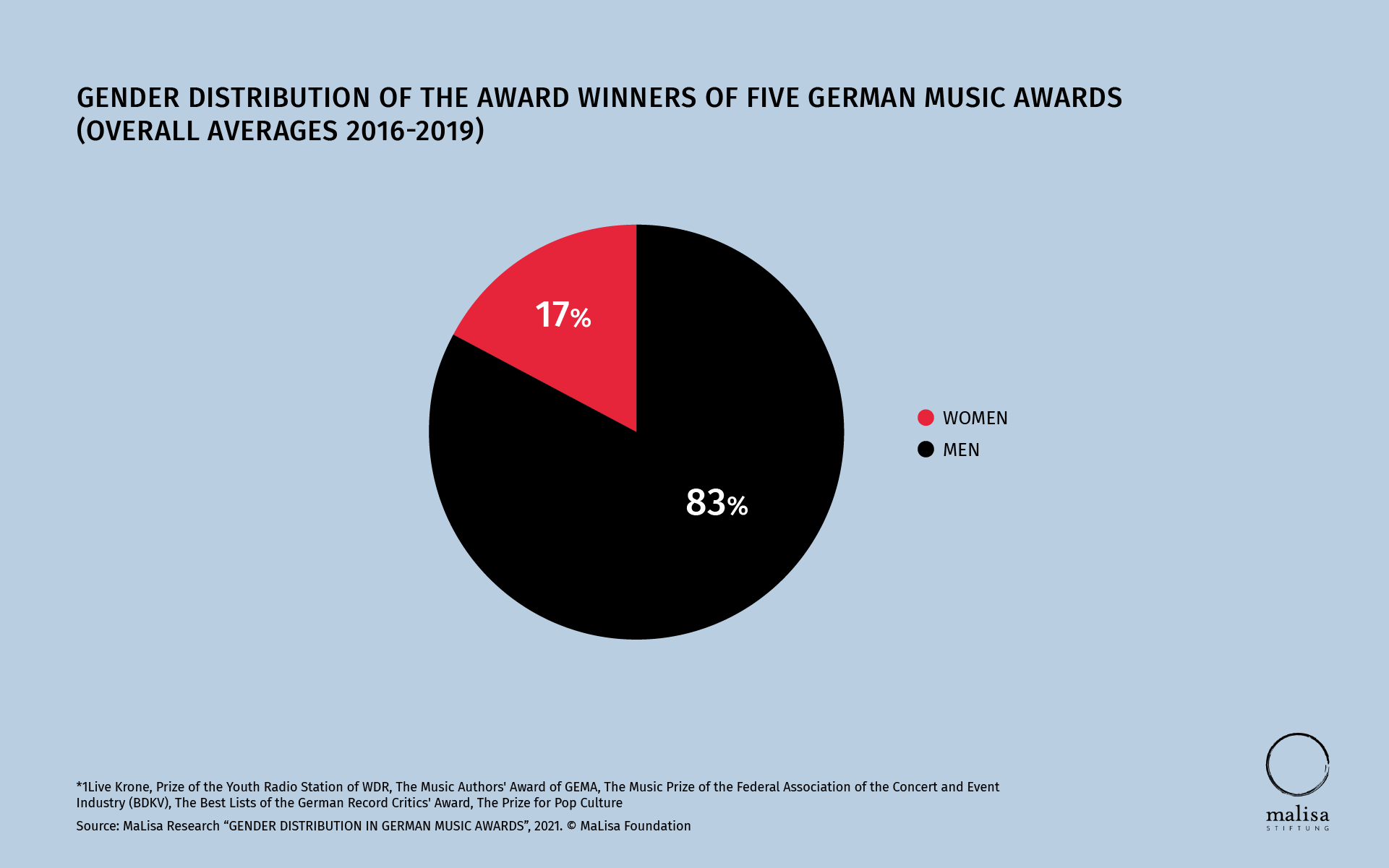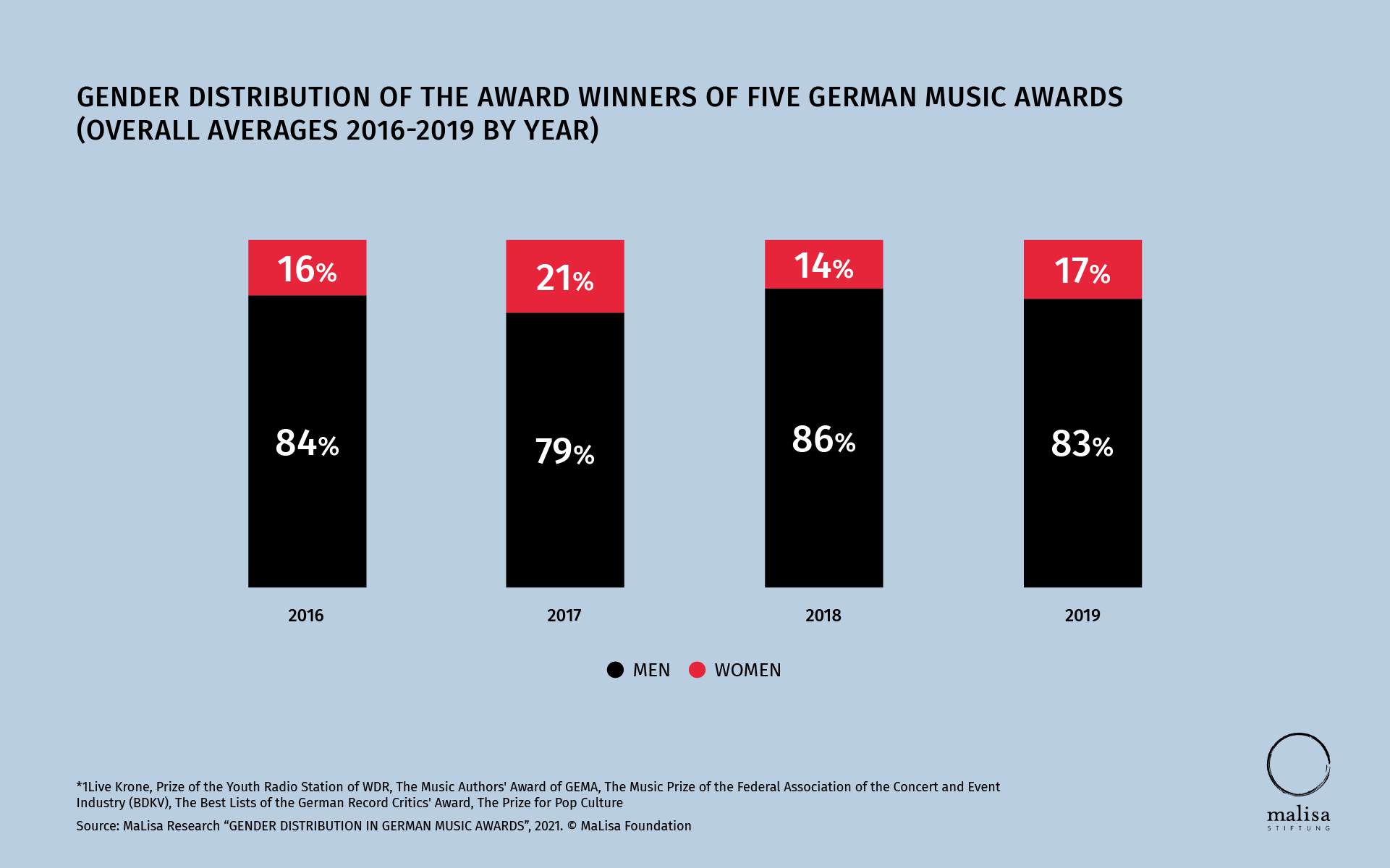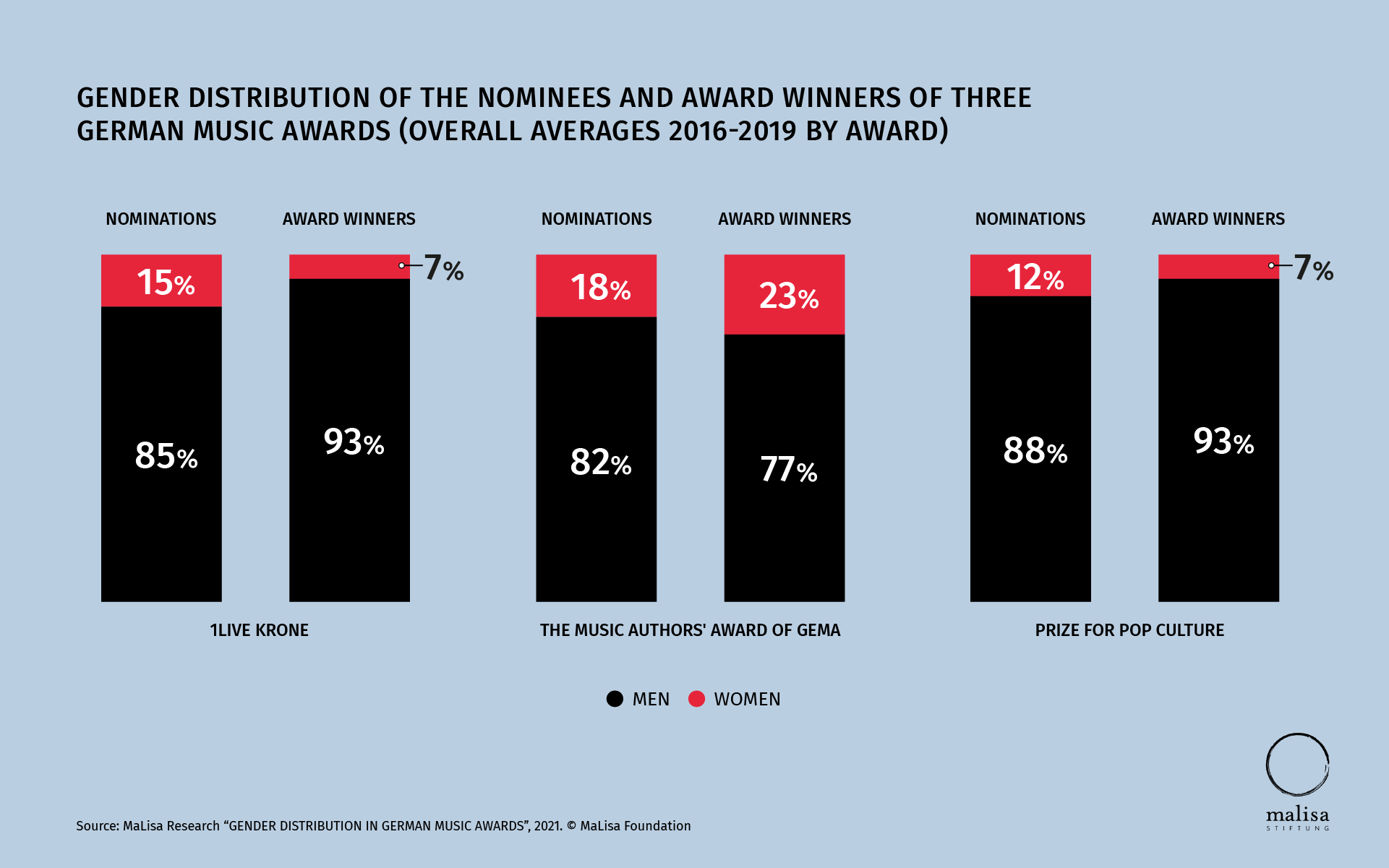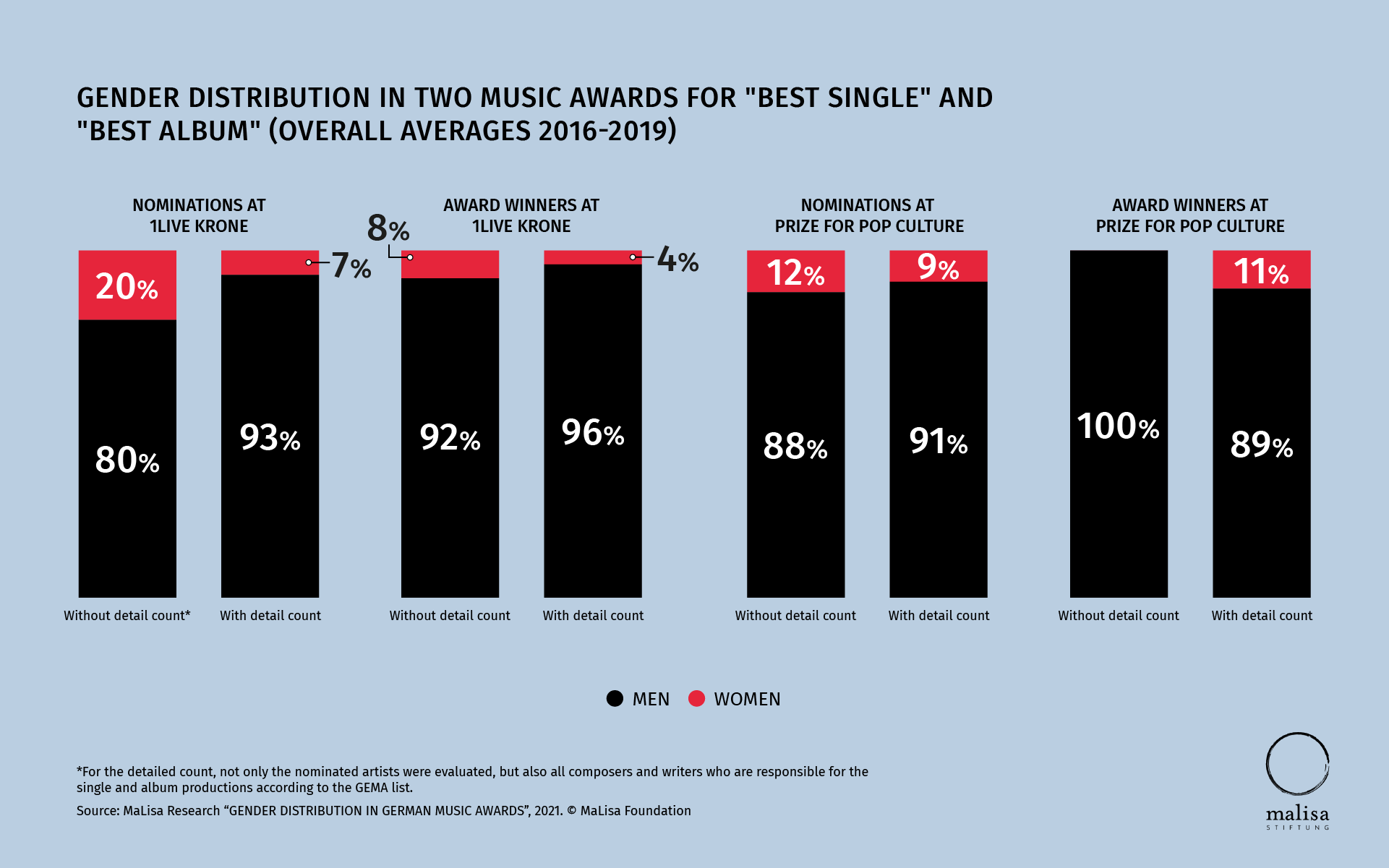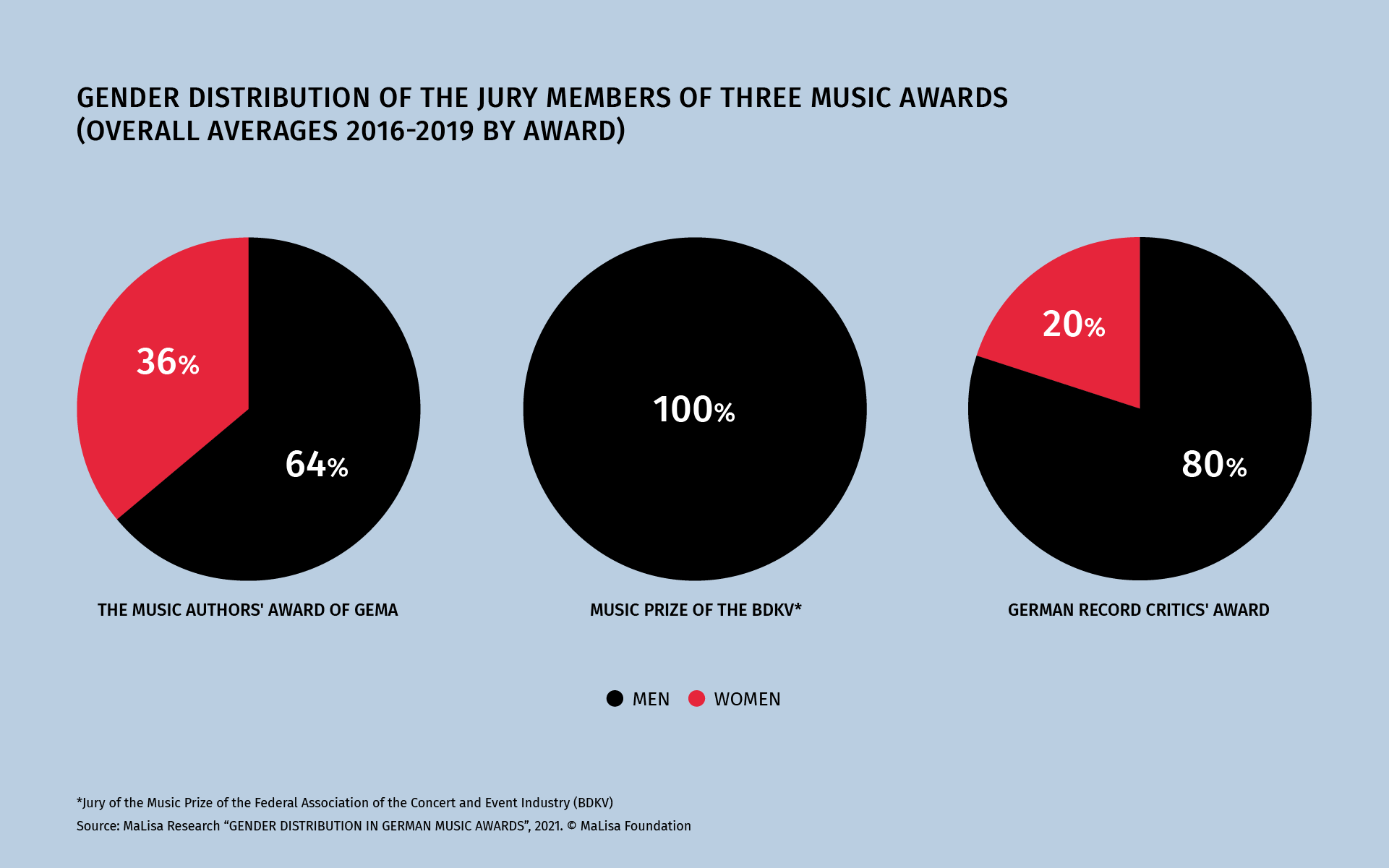STUDIES AND RESEARCH 2021
GENDER JUSTICE IN THE MUSIC BUSINESS
The subject of gender equality in the music business is receiving increasing attention. However, until now, there have only been a few studies on the situation in Germany. The MaLisa Foundation is expanding its work on gender equality in the music business and has dedicated itself more to collecting data in this context: 2021, a study on gender diversity in the music industry and music use was initiated together with Keychange and the Reeperbahn Festival, and the results were published as part of the Reeperbahn Festival. In addition, MaLisa Foundation conducted its own research on pop music awards, analyzing five different music awards.
MALISA RESEARCH: GENDER DISTRIBUTION IN GERMAN MUSIC AWARDS
For the research, five German music awards were analyzed according to the gender distribution of the prize winners based on the names of the musicians. Women and non-binary persons are clearly underrepresented in the five German pop music awards evaluated. This applies to the winners of all five pop music awards as well as to the special evaluations of the nominees, authors and jury members.
METHOD
These music awards were examined from 2016-2019. Due to the pandemic, several prizes were not awarded in 2020. For better comparability, all five prizes were therefore considered for the same period:
- 1Live Krone, Prize of the Youth Radio Station of WDR.
- The Music Authors' Award of GEMA.
- The Music Prize of the Federal Association of the Concert and Event Industry (BDKV).
- The Best Lists of the German Record Critics' Award.
- Prize for Pop Culture.
Gender distribution was determined on the basis of the musicians' first names. On the basis of the first names, non-binarity could not be clearly identified in any case in the sample.
Artists were counted individually. For bands, all members were counted, and the same applies for producer teams. Prizes that focus on German popular music were selected for the study. In the case of prizes that award additional categories, only those from the field of popular music were included.
For three of the five prizes (1 Live Krone, Music Authors' Prize, Prize for Pop Culture), gender ratios among the nominees and the prize winners were also analysed. For the prizes that publicise the composition of the jury (Music Authors' Award, Music Prize of the BDKV, German Record Critics' Award), the gender distribution of the jury was also evaluated.
RESEARCH RESULTS:
Female musicians are awarded prizes significantly less often than their male counterparts: The winners for the period 2016–2019 show a clear male predominance of 83 percent.
Over the course of 2016-2019, no lasting change is apparent: Throughout all of the music prizes, the ratio of female to male prize winners remains at around 1:5 during this period.
It should be noted, however, that women are already likely to be clearly outnumbered in the nominations. A special analysis of three of the five music prizes shows that the gender distribution among the nominees only changed slightly: 14 percent women overall on average among the nominations, 12 percent women among the prize winners.
The analysis of all composers, lyricists and authors involved in the production of singles and albums (according to the GEMA directory) shows a similar ratio between men and women.
Men are also clearly in the majority in the juries that determine the prize-winners.
QUO VADIS MUSIC AWARD?
Music awards put selected artists in the spotlight and help them gain more popularity and career opportunities. They thus send an important signal for the industry as a whole, for up-and-coming artists, and also for consumers.
The clearly unbalanced gender distribution among nominees, award winners and jury members contributes to a consolidation and reinforcement of already existing disadvantages for women in the music business.
To counteract this, analyses of the causes for the exclusion of women*, as well as effective measures for a more balanced gender ratio on the different levels of music awarding are necessary. A first step would be to establish transparency concerning the gender distribution of the jury, nominees and award winners in the call for nominations and awarding all music prizes.
MaLisa research on gender distribution in German pop music awards (download available in German language)
***
STUDY ON GENDER DIVERSITY IN THE MUSIC INDUSTRY AND MUSIC USAGE
For this research, the MaLisa Foundation cooperated with the international initiative, Keychange, which is represented in Germany by the Reeperbahn Festival, for the "Study on Gender Diversity in the Music Industry and Music Usage”. The survey was conducted by the opinion research institute, Kantar.
The results show that women and men assess the equality of opportunities in the sector very differently. This applies both to the assessment of the status quo, and to the perception of improvements in the last five years. Furthermore, it shows that almost every woman surveyed has experienced discrimination based on her gender. In the case of music consumers, it became clear that different age groups have different perspectives. A number of possible measures to be taken for more gender justice were evaluated by the respondents.
Study concept and methodology
For the study, various surveys were conducted from April to August 2021 and supplemented with information from external sources.
- Music industry survey: Online survey of employees of the 15 associations participating in the study (344 interviews).
- Expert interviews: Qualitative in-depth interviews with artists, music managers, and concert promoters (25 interviews).
- Consumer survey: Online survey of music consumers* aged 16-69 (2,002 interviews).
- Further sources: Consultation of data from other publications and freely available sources
Definitions
- Music business: The term "music business" refers to the professional business sector that deals with the production, promotion, and distribution of music as a commodity in the economic sense.
- Gender: In the course of the surveys, the gender of the participants was asked. In addition to "male" or "female", there was also the option to identify as "diverse". “Diverse” is a category of gender recognized by personal status law in Germany. However, due to a very small number of cases (n = 4), this group could not be identified separately. In view of this fact, the results are only presented separately for women and men.
- Gender diversity: "Gender diversity" means a mixture of e.g. male, female, or abinary artists that includes all genders (i.e. not only those who feel they belong to a certain gender, but also all persons who do not clearly assign themselves to one gender). With regard to music, it means the balanced presence of all genders, e.g. in relation to their performances at festivals.
KEY FINDINGS OF THE STUDY:
- Action is needed regarding equality of opportunities for women and men in the music business
Existing gender inequalities
- Women are critical of the status quo regarding equal opportunities in the music business. Only about one in seven women in the sample is of the opinion that men and women share equal opportunities. Men and women perceive equality of opportunities very differently.
- Almost every woman surveyed from the music business has personally experienced gender discrimination.
- Women are significantly more likely than men to face barriers to their professional development, in particular: Stereotypes, prejudices, and “old boys networks”.
- All of this has a detrimental effect on women's careers, as evidenced not least by the fact that women are less likely to be represented in management positions and on average earn less than men.
Measures for improvement
- The younger generation matters: A majority sees the targeted promotion of young people as a useful measure towards gender equality. Mentoring and female networks are also considered useful.
- So far, however, too few measures have been sufficiently implemented. Therefore, there is a need for effective measures to remove the biggest obstacles, such as favouritism and stereotypes. Quotas can be a suitable means to this end.
- About every other woman is in favour of quotas for concerts/festivals or for leadership positions. Among men, only about one in three is in favour.
- The topic of gender diversity has not yet reached music consumers in general, but it will become increasingly relevant
Gender diversity and music marketing
- The majority of music business stakeholders surveyed believe that a high degree of gender diversity improves the quality of music and has a positive impact on their marketing.
- Less than half believe that music consumers already expect diversity or that it is a purchasing criterion. About one in three currently feels demand pressure from music consumers with regard to gender diversity.
- Slightly less than one in two is currently in favour of a fixed quota, for example for concerts or radio airplay.
The consumer perspective
- Gender diversity is particularly relevant for younger consumers aged 16 to 29.
- The topic of gender diversity will become more significant in the future: One in three consumers surveyed would like to see the issue receive more public attention; among younger consumers, almost one in two.
- Consumers consider the music business to be primarily responsible, but many are also prepared to take responsibility themselves.
RECOMMENDED ACTION: CREATE MORE VISIBILITY IN THE MUSIC BUSINESS AND MARKETING
It is essential to create more visibility and more opportunities for women and gender minorities in the music business.
The quota can be an effective tool to establish more equality. Empirical examples show that where quotas have been introduced, the percentage of women represented increases.
Mentoring and female networks are also considered useful. To end the exclusion of women from existing, male-dominated networks, female networks alone will probably not be sufficient. Mixed networks of men and women seem more forward-looking.
The measures require a change in thinking and a greater willingness to take risks on the part of the stakeholders in the music business. It can also be assumed that the next generation of music consumers will put more pressure on the music business to effect change and offer greater diversity.
Ultimately, it is up to the music business itself to create visibility for gender diversity in marketing by offering appropriate music products, introducing quota regulations and signing voluntary commitments. With the current state of music marketing, it is still difficult for consumers to align their purchases with the goal of balanced gender diversity.
A detailed summary of the results, including graphics, is available for download here.

STUDIES AND RESEARCH 2021
GENDER JUSTICE IN THE MUSIC BUSINESS
STUDY ON GENDER DIVERSITY IN THE MUSIC INDUSTRY AND MUSIC USE (INCL. RESULTS AND GRAPHICS)Artist: Antje Schomaker, Fotocredit: Markus Nass
